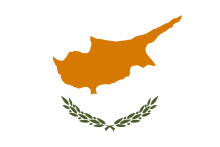Portal:Cyprus
The Cyprus Portal

Cyprus (/ˈsaɪprəs/ ), officially the Republic of Cyprus, is an island country in the eastern Mediterranean Sea. It is geographically a part of West Asia, but its cultural ties and geopolitics are overwhelmingly Southeast European. Cyprus is the third largest and third-most populous island in the Mediterranean. It is east of Greece, north of Egypt, south of Turkey, and west of Lebanon and Syria. Its capital and largest city is Nicosia. Cyprus also shares land borders with Akrotiri and Dhekelia, a dependent territory of the United Kingdom. The northeast portion of the island is de facto governed by the self-declared Turkish Republic of Northern Cyprus.
Cyprus was first settled by hunter-gatherers around 13,000 years ago, with farming settlements emerging a few thousand years later. During the late Bronze Age, Cyprus, known in contemporary sources as Alashiya, developed an urbanised society closely connected to the wider Mediterranean world. Cyprus experienced waves of settlement by Mycenaean Greeks at the end of the 2nd millennium BC. It was subsequently occupied by several major powers, including the empires of the Assyrians, Egyptians and Persians, from whom the island was seized in 333 BC by Alexander the Great. Subsequent rule by Ptolemaic Egypt, the Classical and Eastern Roman Empire, Arab caliphates for a short period, the French Lusignan dynasty and the Venetians was followed by over three centuries of Ottoman rule between 1571 and 1878 (de jure until 1914). Cyprus was placed under the United Kingdom's administration based on the Cyprus Convention in 1878 and was formally annexed by the UK in 1914.
The future of the island became a matter of disagreement between the two prominent ethnic communities, Greek Cypriots and Turkish Cypriots. From the 19th century onwards, the Greek Cypriot population pursued enosis, union with Greece, which became a Greek national policy in the 1950s. The Turkish Cypriot population initially advocated the continuation of the British rule, then demanded the annexation of the island to Turkey, and in the 1950s, together with Turkey, established a policy of taksim, the partition of Cyprus and the creation of a Turkish polity in the north. Following nationalist violence in the 1950s, Cyprus was granted independence in 1960. The crisis of 1963–64 brought further intercommunal violence between the two communities, displaced more than 25,000 Turkish Cypriots into enclaves and brought the end of Turkish Cypriot representation in the republic. On 15 July 1974, a coup d'état was staged by Greek Cypriot nationalists and elements of the Greek military junta. This action precipitated the Turkish invasion of Cyprus on 20 July, which led to the capture of the present-day territory of Northern Cyprus and the displacement of over 150,000 Greek Cypriots and 50,000 Turkish Cypriots. A separate Turkish Cypriot state in the north was established by unilateral declaration in 1983; the move was widely condemned by the international community, with Turkey alone recognising the new state. These events and the resulting political situation are matters of a continuing dispute. (Full article...)
Selected article -

The Republic of Cyprus (Cyprus) and Turkey have been engaged in a dispute over the extent of their exclusive economic zones (EEZ), ostensibly sparked by oil and gas exploration in the area. Turkey objects to Cypriot drilling in waters that Cyprus has asserted a claim on. The present maritime zones dispute touches on the perennial Cyprus and Aegean disputes; Turkey is the only member state of the United Nations that does not recognise Cyprus, and is one of the countries which are not signatory to the United Nations Convention on the Law of the Sea, which Cyprus has signed and ratified.
Turkey claims a portion of Cyprus' EEZ based on Turkey's definition that no islands, including Cyprus, can have a full 200 nautical mile EEZ authorized to coastal states and should only be entitled to their 12 nautical mile territorial seas. Turkey's definition creates a dispute over the rights to waters south of Cyprus containing an offshore gas field. This definition is not shared by most other states. Furthermore, the internationally unrecognized Turkish Republic of Northern Cyprus (TRNC), which was created as result of the Turkish Invasion of Cyprus, which took place in response to 1974 Cypriot coup d'état, also claims portions of Cypriot EEZ. Cyprus and other countries including Israel, France, Russia and Greece view these claims on Cyprus' land and sea as illegal under international law and urge Turkey to refrain from illegal drilling for gas in the island's EEZ. The European Union has threatened Turkey with economic and political sanctions for violating the Cypriot EEZ. (Full article...)
Cyprus news
- 3 October 2024 – Israel–Hezbollah conflict
- A Hellenic Air Force plane evacuates Greek and Cypriot nationals from Beirut–Rafic Hariri International Airport in Lebanon. (Ekathimerini)
- 24 September 2024 – Israel–Hezbollah conflict
- The United Kingdom deploys 700 troops to Cyprus ahead of a planned evacuation of thousands of British nationals from Lebanon. The UK has advised all of its citizens to leave Lebanon immediately if they can. (Reuters)
General images
Related portals
Religions in Cyprus
Countries with related heritage
Nearby countries
Things you can do
- Improve the project; WikiProject Cyprus
WikiProjects
Associated Wikimedia
The following Wikimedia Foundation sister projects provide more on this subject:
-
Commons
Free media repository -
Wikibooks
Free textbooks and manuals -
Wikidata
Free knowledge base -
Wikinews
Free-content news -
Wikiquote
Collection of quotations -
Wikisource
Free-content library -
Wikiversity
Free learning tools -
Wikivoyage
Free travel guide -
Wiktionary
Dictionary and thesaurus

























![Image 28Cypri insvla nova descript 1573, Ioannes á Deutecum f[ecit]. Map of Cyprus newly drawn by Johannes van Deutecom, 1573. (from Cyprus)](http://up.wiki.x.io/wikipedia/commons/thumb/b/b7/Atlas_Ortelius_KB_PPN369376781-073av-073br.jpg/120px-Atlas_Ortelius_KB_PPN369376781-073av-073br.jpg)
























































